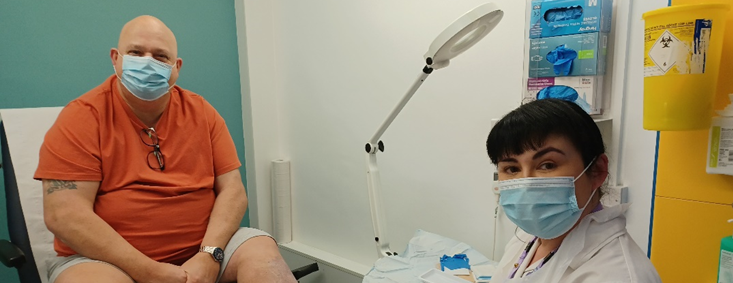Manchester recruits the first European patient to chronic wound treatment study
A patient at Manchester University NHS Foundation Trust (MFT), living with an ulcer on the same area of his foot since 2011, is the first person in Europe to trial a new treatment for long-term (chronic) wounds.
Nigel Rooke, 56, is retired and lives in Moston in North West Manchester. He is the first patient to take part in the 12-week study, which will follow the healing progress of exuding (oozing) chronic wounds by using two consecutive dressing types.
Chronic wounds usually produce excessive wound fluid, known as exudate. Wound exudate is produced as a normal part of healing and is mainly water, but also contains proteins, enzymes, cells and waste products. In a wound that is progressing normally, exudate production generally reduces over time, but in chronic wounds exudate is believed to prolong inflammation and to be detrimental to healing.
At least 80,000 people in the UK have an open, complex wound and the NHS spends approximately £3bn annually on wound care.
The Exuflex study is taking place at North Manchester General Hospital, (NMGH) and Manchester Local Care Organisation North Manchester Community Podiatry, both part of MFT, and is funded by Molnlycke Health Care AB.
Nigel Rooke, said: “I have diabetes, and foot ulcers can be a complication of this condition. I have tried all sorts of treatments to date, including other dressings, specialist slippers, and creams.
“My wife used to be a nurse and has been fantastic in helping me to manage daily life with this ulcer.
“Due to my diabetes, I do not have any sensation in my feet. I can be unaware if I am aggravating the ulcer and causing further damage, because I don’t feel any irritation or pain, so I do have to be very careful.
“I enjoy going to watch Manchester City and there have been times when it’s been raining, and my shoes and feet have become wet. This has made the wound worse, but I haven’t been aware of the damage at the time.

Nigel Rooke with Kimberley Wilde, Advanced Podiatrist at Harpurhey Health Centre and lead investigator for the study at Manchester
I hope this treatment could offer a long term solution for myself, or others living with a chronic wound.
Kimberley Wilde, Advanced Podiatrist at Harpurhey Health Centre and lead investigator for the study at MFT, said: “These dressings are designed to be gentle to apply and remove, as reduction in trauma to the healing skin should result in better wound healing.
“However, alongside faster healing I hope there may be other potential benefits to this new treatment. While due to the nature of certain conditions that some patients have, they do not experience a lot of pain, others can find the experience – particularly for dressing and re-dressing the wounds – from uncomfortable, to extremely painful.
“Also, with less trauma to the wounds it is easier for patients to self-manage at home. Supported self-management has the potential to relieve pressure on health and social care services and allows patients to be involved in their care as much as possible.”
More about this research
The Exuflex study involves two types of dressing. The first type of dressing Exufiber, is designed to absorb and retain high amounts of wound fluid. In contact with wound fluids it transforms into a gel that helps both wound healing and ease of removal during dressing changes. Easy removal helps to protect the new skin from trauma.
As wounds heals a dressing that absorbs high volumes of wound fluids is not optimal so a second type of dressing Mepilex Border Flex will be used, which is also designed for easy removal.




